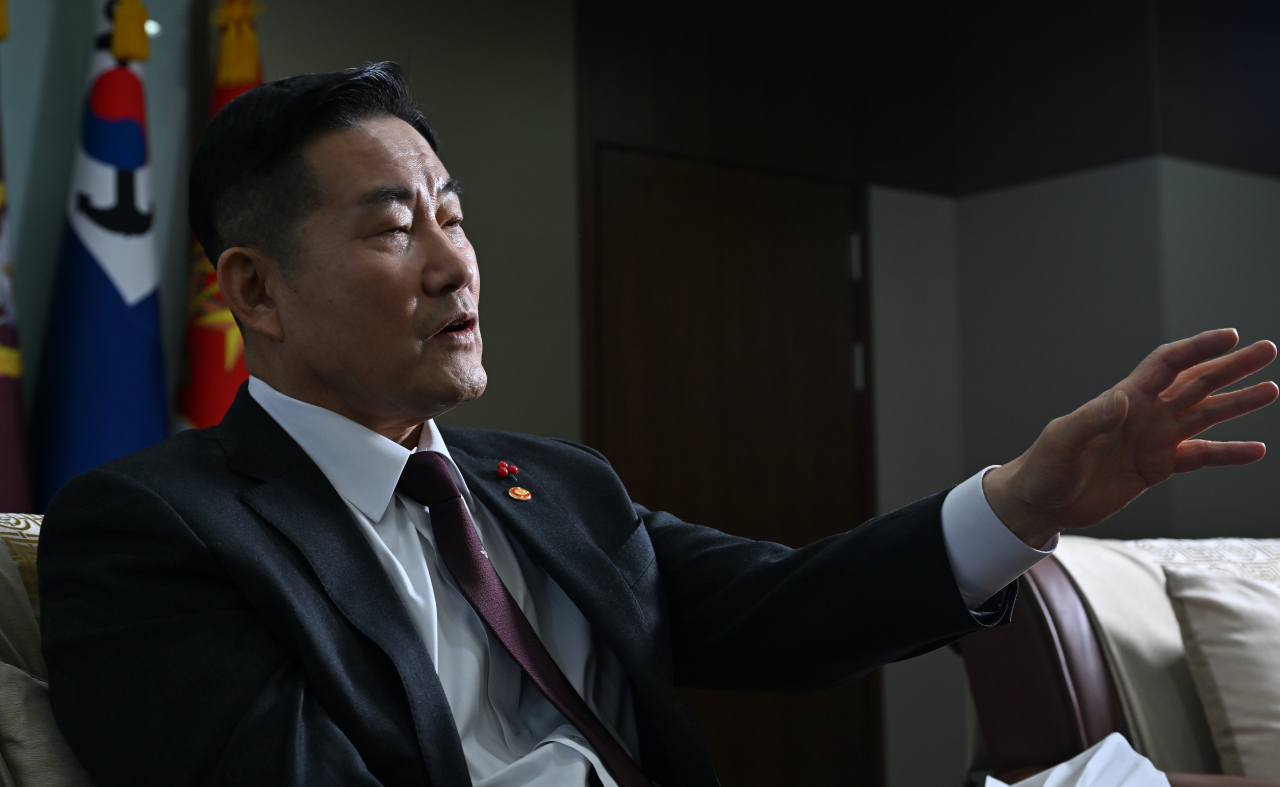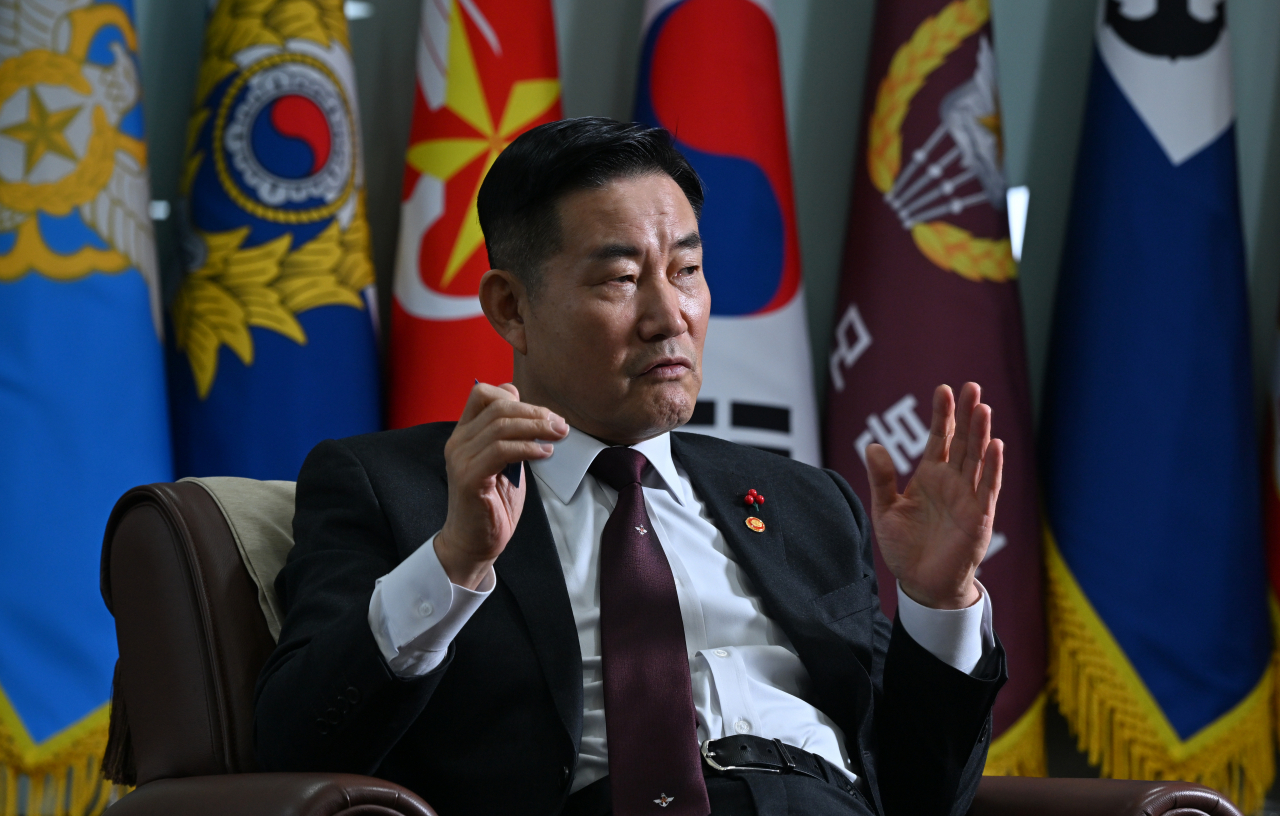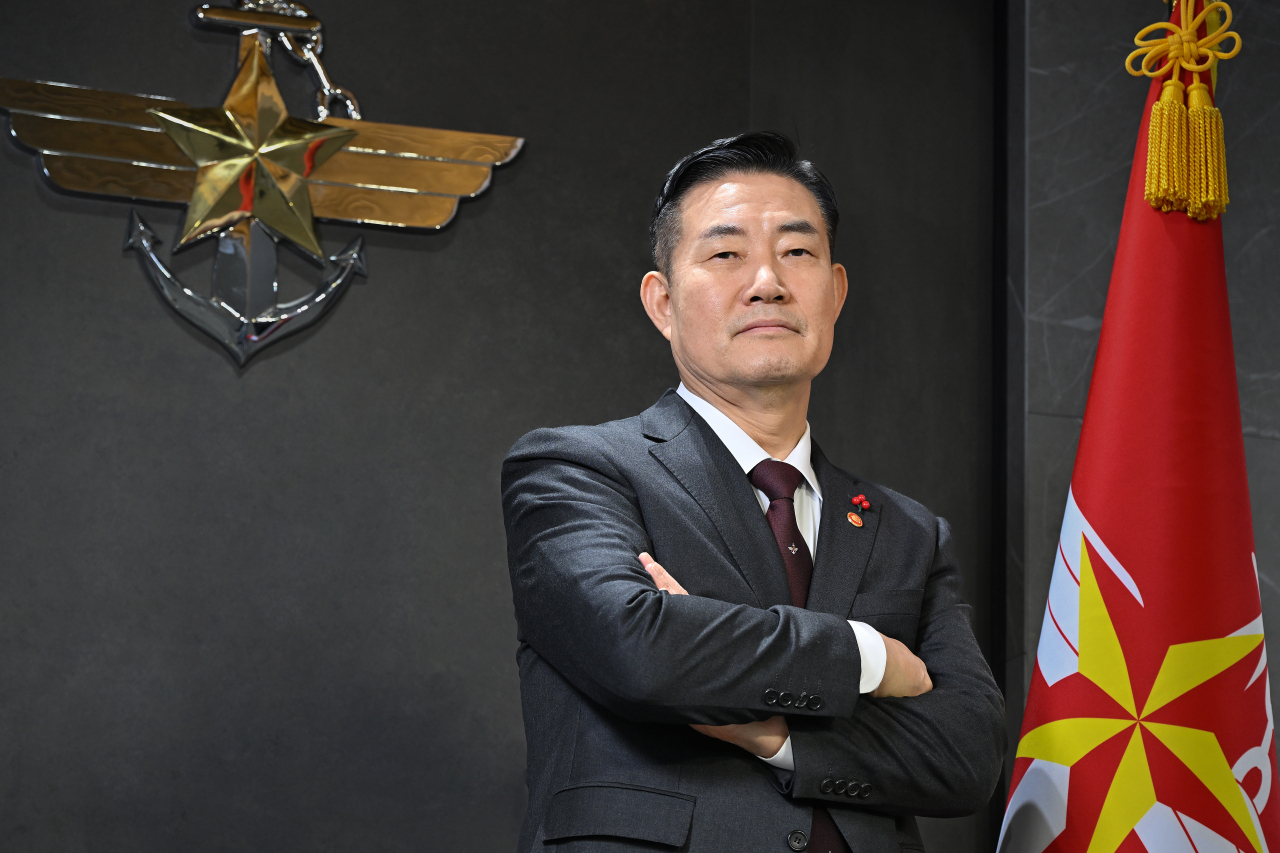Kim Jong-un nostalgic for engagement approach of 2018: Seoul defense chief
Extra military aid from Putin may involve air defense systems at potential Pyongyang summit
By Kim ArinPublished : Jan. 23, 2024 - 18:45

Shin Won-sik, the minister of national defense of South Korea, says North Korean leader Kim Jong-un could carry out a nuclear weapons test at any time this year if he believes he could gain what he wants from the next US president by doing so.
In an interview with The Korea Herald on Monday, the South Korean defense chief said North Korea’s Kim may seek to leverage the US presidential election in November to get the incoming administration in Washington to accede to his demands.
North Korea may try to “push to the brink” of a security crisis by intensifying weapons tests and simulations of attacks on South Korea and the US, if Kim Jong-un is “let to believe doing so could make the next US administration give him want he wants,” he said.
The response came after The Korea Herald asked if he thought a nuclear test by North Korea was viable this year in the context of the presidential election in the US.
“For several years since the last time North Korea tested a nuclear bomb in 2017, which was its sixth, Kim Jong-un did not actually go through with his threats of conducting a seventh test,” he said. “That’s because we made sure not to give him any reason to think another nuclear test would work out in his favor.”
The calculus for Kim could soon change with the US presidential election coming up late this year, he said. And the North Korean leader could act out with even more provocations, seeking to return to a time when he could threaten Seoul and Washington into listening to him.
“Kim Jong-un would surely love to turn the clock back to the years he misses most, 2016 and 2017, when he was still able to weaponize climbing tensions on the Korean Peninsula,” he said.
The minister said the North Korean leader would seek to make the year 2025, when a new administration is in charge in the US, “once again like 2018,” in an apparent reference to the US-North Korea summit in Singapore. Then-President Donald Trump met with the Kim in an unprecedented move for a sitting US leader.
“The best time for Kim Jong-un to have nuclear weapons was the year 2018,” he said. “Kim launched ballistic missiles and conducted a sixth nuclear test in 2017. Then when he waved the olive branch in early 2018, South Korea and the US were so swept off our feet.”
He said that Kim “must be nostalgic for the US-North Korea diplomacy of that era.”
“He will be watching for signs in the US for a possible retreat from a policy of sanctions and toward one of appeasement once again, and which presidential candidates support such a change,” he said.
Such North Korea rhetoric from potential US presidents “will signal to him that the advantages of testing his nuclear arsenal could outweigh the disadvantages, like before,” Shin said. “In which case, he would feel emboldened to undertake a nuclear test any time.”
Politics aside, the minister said “at least a couple of tests is essential” for North Korea to verify the reliability of its newly developed tactical nuclear weapons and high-yield hydrogen bombs. Intelligence authorities in Seoul said earlier this month that the need for another nuclear test was “higher than before” for North Korea, citing the Hwasan-31 warheads unveiled in March last year.
“The perceived strategic gains and the military necessity are two important benchmarks for determining whether a seventh nuclear test will be carried out, I think,” he said, adding that a lot of variables were at play.
The minister warned that the North Korean leader “would be absolutely mistaken to think there is more for him to gain than to lose from an additional nuclear test.”

He said “the fortified bilateral nuclear deterrence” built under the current Joe Biden administration together with South Korea has ensured “no nuclear assault from North Korea will be tolerated, ever.”
“Such an attempt would mean the end of the Kim Jong-un regime. He will be faced to realize the choice will come down to his survival or nukes,” he said, reiterating the warning he has delivered in past public appearances. He added that the circumstances of late, such as United Nations sanctions, prevented a president of any political party from engaging with North Korea.
The minister said that at a key meeting taking place in the summer, the commitments to mutual defense outlined in the Washington Declaration will be “cemented” to remain firm under any US president.
Presidents Yoon Suk Yeol and Biden adopted the Washington Declaration in April last year -- which the minister called the “strongest affirmation of extended deterrence from the US to date.”
He said that at the August meeting of the Nuclear Consultative Group, the South Korea-US body for implementing the Washington Declaration, the joint nuclear deterrence against North Korea pursued by Yoon and Biden will be “institutionalized” and “signed into measures of irreversibility.”
Besides, South Korea is on the “front lines” of the strategic rivalry between the US and China, he pointed out. “No matter which administration takes power, the US is unlikely to do anything that could risk eroding the confidence of not only South Korea but of other important allies,” he said.
Shin said he “highly doubts” that a possible contingency in Taiwan could lead to some of the US forces stationed in South Korea being pulled out. He was responding to The Korea Herald's question about what impact such a move by the US could have on the security situation on the Korean Peninsula.
“I don’t believe it is something we should be worried about. In such a scenario, even more US strategic assets will have to be deployed here. To weaken the US forces here will be a very inappropriate move,” he said. “I trust the US administration and the Pentagon to make the right call.”
He went on, “If domestically in South Korea we keep questioning whether the US forces will stay, we might be giving the wrong sign that it is a possibility. We don’t want that, and our answer will have to be a firm ‘no.’”

On the possible visit of Russian President Vladimir Putin to Pyongyang, the minister said that additional transfers of military technology were anticipated. “We’re on the lookout for the extent and the kinds of technology that Russia could provide North Korea with,” he said.
Asked if he thought Russia could help North Korea hone its nuclear technology, despite being a party to the Nuclear Nonproliferation Treaty, he said the country “has already shown it is capable of ignoring the sanctions it agreed to impose as a permanent member of the UN Security Council.
“The concern is that Russia might offer North Korea the help it needs without much restraint.”
Russian help was already suspected to be behind North Korea’s successful launch of a spy satellite in November last year, and with continued cooperation from Russia, North Korea could launch yet another such satellite with improved capabilities.
He said that this time Russia’s assistance, which is believed to have mainly involved satellite and space-related technology so far, could range from missile technology for building ballistic and cruise missiles to air defense systems and the aircraft that North Korea most sorely lacks.
In another instance of troubling alignment between the two countries, he said North Korea appears to have shipped “over 5,500 containers” of arms and munitions to Russia based on the latest assessment. “We don’t yet know what exactly is in them, but we think they are primarily artillery weapons that Russia needs most as well as some short-range ballistic missiles,” he said.
On South Korea’s Ukraine aid being limited to a humanitarian and financial nature, he said personally he sees “full support as the way to go as a member of the free world,” but that he stands by the government’s policy.
In a previous interview with The Korea Herald in June last year, Shin, then a lawmaker with the ruling party, said he supported supplying weapons to Ukraine -- either lethal or nonlethal. “The days of strategic ambiguity are over,” he had said at the time, arguing that South Korea must take a side.
The minister said that North Korea was also thought to have provided weapons to Hamas, the Palestinian Islamist militant group at war with Israel since its attack on Gaza in October last year.
“I do think there have been military exchanges between North Korea and Hamas on a steady basis, although it’s hard to say at this point if the North Korean weapons were sent before or after the breakout of war,” he said.
The minister said that the South Korean military was continuing to “closely follow” the possibility of a sudden change in the North Korean regime.
Recently, the National Intelligence Service said that 10-year-old Ju-ae, Kim Jong-un’s only publicly known child, was his “most likely successor.” The Ministry of Unification overseeing inter-Korean affairs said worsening food shortages in North Korea were pushing more to flee the country, citing defectors.
Despite a rise in provocations from North Korea, the minister said he believes South Korea was in a state of peace.
“For the past 70 years since the Korean War, North Korea hasn’t ceased making military threats of varying scales. All throughout those seven decades, we kept them from waging a war,” he said.
“In a market economy, the world is doing business with South Korea because they believe we are in a state of peace. That is how our economy has grown as much as it has.”
The minister said the only way to peace was through force.
Under his leadership, the South Korean military was responding to North Korean threats on the principle of instant retaliation known as “PISU,” or “Punish Immediately, Punish Strongly, Punish Until the end.”
“In the past, we entertained the idea of peace and reconciliation with North Korea from time to time, which invariably returned with an even greater military provocation,” he said.
“With criminals like the Kim Jong-un regime as our neighbors, there is no other way of maintaining peace than through force.”



















![[Today’s K-pop] Treasure to publish magazine for debut anniversary](http://res.heraldm.com/phpwas/restmb_idxmake.php?idx=642&simg=/content/image/2024/07/26/20240726050551_0.jpg&u=)